http://www.proibidoler.com/quadrinh...tras-obras-sejam-banidas-de-sua-universidade/
A estudante universitária Tara Shultz, da Universidade Crafton Hills (Yucaipa, Califórnia), merece um troféu de “babaca do ano” pelas atitudes que tem tomado.
Ela ficou chocada ao ler
“Persépolis”, o romance gráfico autobiográfico homônimo de Marjane Satrapi, cuja trama começa pouco antes da Revolução Iraniana, quando Marjane atinge a adolescência, e acaba quando ela é uma expatriada de 22 anos.
O motivo do “choque” da estudante? A violência contida nas páginas da obra.
Mas não foi apenas esse título que abalou as estruturas da estudante de 22 anos. Shultz ficou extremamente consternada com o conteúdo de quatro
graphic novels cuja leitura foi exigida para seu curso, que junto com seus pais está tentando banir as obras da universidade.
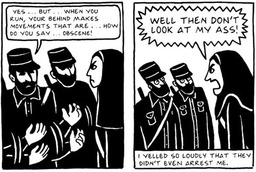
A cadeira que exigiu a leitura do material se chama “English 250″, e sua descrição oficial é “O estudo da graphic novel como um meio viável de literatura através de leitura, discussões em classe e atribuições analíticas”. (Sim, eu sei que você queria ter essa cadeira em seu curso, eu também queria.)
Além de
“Persépolis”, entraram na mira da estudante as seguintes obras:
– Fun Home, da quadrinista estadunidense Alison Bechdel.
Na trama a autora lida com temas como homossexualidade, família, relação entre pais e filhos e independência pessoal utilizando-se de episódios de sua própria trajetória e de sua família.
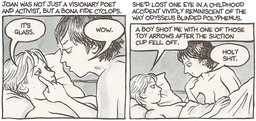
– Y: O Último Homem, de Brian K. Vaughan e Pia Guerra
A história conta sobre o único homem sobrevivente de uma súbita, espontânea e simultânea morte de todos os animais do planeta com cromossomo Y, incluindo humanos.

– Sandman – A Casa de Bonecas, de Neil Gaiman e Mike Dringenberg
Conta a história de Rose Walker, que após uma viagem misteriosa, tem a vida mudada para sempre. A trama envolve parentes há muito tempo perdidos, uma casa repleta de moradores excêntricos, uma convenção de
serial killers e, no final de tudo, a impressionante descoberta de sua identidade verdadeira.

“Eu não esperava abrir esses livros e ver aquele tipo de material gráfico. Eu esperava ver Batman e Robin, não pornografia” – disse a moça, numa entrevista ao Redlands Daily Facts.
O professor Ryan Bartlett, que ministrou o curso de três semestres e não se deparou com queixas anteriores, defendeu todas as obras:
“Eu escolhi várias graphic novels altamente aclamadas e premiadas para o meu curso. Não porque elas são supostamente atrevidas, mas porque cada uma fala sobre as dificuldades da condição humana. Como Faulkner afirma, ‘A única coisa sobre a qual vale a pena escrever, é sobre o coração humano em conflito consigo mesmo.’ O mesmo pode ser dito sobre a leitura de literatura. Os personagens dos romances gráficos escolhidos estão todos lutando com questões de moralidade, auto-descoberta, rupturas, etc.”
Shultz e seus pais protestaram, nesta quinta-feira, do lado de fora do prédio da administração do campus, pedindo que, no mínimo, a universidade coloque um aviso ou advertência sobre as indecências da matéria. Mas não é só isso que alouca estudante quer:
“Eu gostaria que essas obras fossem erradicadas do sistema. Eu não quero que mais ninguém tenha que ler esse livo.”
E seu pai (no melhor estilo o-que-as-crianças-vão-pensar), ainda adicionou:
“Nós ainda não chegamos lá, mas queremos discutir a questão dos livros que estão sendo vendidos na livraria da Universidade. Há menores de idade neste campus!”
Ok gente, este é o tipo de matéria que cria bastante discussão e que eu não consigo publicar sem dar minha opinião. Primeiro, porque eu trabalho com quadrinhos e sou uma leitora assídua dos mais diferentes tipos de materiais gráficos oferecidos por essas obras.
Segundo, porque sou totalmente contra a censura. E terceiro, porque TODA ESSA HISTÓRIA É COMPLETAMENTE RIDÍCULA!
Seria cômico, se não fosse trágico.
Temos quatro obras aclamadas pela crítica e premiadas mundialmente. Só que antes de defender tais obras usando argumentos como “crítica” e “prêmios”, há algo muito mais valioso nelas e que transcende esses dois fatores materiais:
– Temos o trabalho autêntico, emocionante, magnífico e crítico de todos os nomes responsáveis pelas publicações dessas obras. São escritores e artistas que estão sendo vergonhosamente desrespeitados.
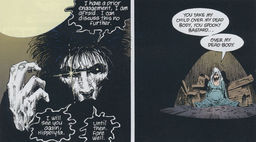
– Temos histórias reais, e o mundo real não é um conto de fadas como a cabeça da estudante Tara Shultz imagina. Um relato autobiográfico sobre a Revolução Iraniana (Persépolis) e outro sobre homossexualidade, família e independência pessoal (Fun Home) não são apenas histórias ficcionais, criadas com o intuito de divertir e enriquecer seus produtores.
Mais do que isso, são formas de arte usadas para expressar sentimentos e experiências reais, vividos por pessoas reais, no mundo real. Quando Tara Shultz chama esse material de “lixo”, está chamando a vida dessas pessoas de “lixo”, e isso é inadmissível.
No momento em que ela protesta contra essas obras, condenando o conteúdo “sexual, violento e obsceno”, está sendo cega, hipócrita e ignorante. Marjane Satrapi não escolheu viver toda a violência que descreveu em sua obra, essa violência simplesmente existe e acontece diariamente, quer seu mundinho cor-de-rosa aceite ou não.
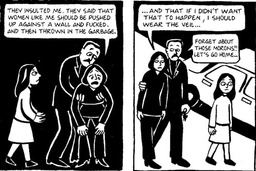
– Temos críticas sociais, filosofia, metáforas sobre o desenvolvimento dos seres humanos e, acima de tudo, histórias maravilhosas. Eu entendo que nem todas as pessoas tenham capacidade mental ou estômago para apreciar as obras, mas tentar impedir que outros tenham acesso a elas é mais do que inapropriado, é criminoso.
Censurar uma obra que você não entende e tirar a autoridade das pessoas sobre suas próprias escolhas (como, por exemplo, se quer ou não ler algo) é criminoso, sim! É inaceitável.
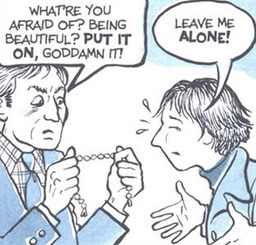
Enfim, acredito que todos (ou, pelo menos, a maioria) que lerem este artigo vão concordar comigo. Nos Estados Unidos há pessoas extremamente conservadoras, criadas num regime rígido, baseado na maioria dos casos em religião.
O caso dessa garota e seus pais é apenas mais um, e não será o último. Nos resta torcer para que não alcancem seu objetivo e para que as pessoas saiam dessa redoma de vidro que as impede de enxergar o mundo como ele é, e respeitar a arte como forma livre de expressão.


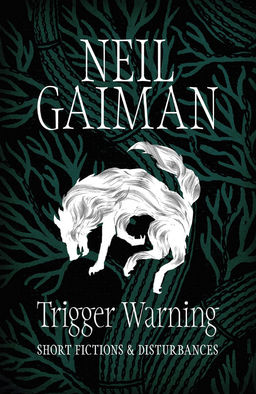
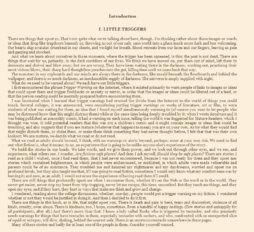



 he said. Then, very soberly, he added: “Anxiety is not an undesirable emotion. It’s a human emotion.”
he said. Then, very soberly, he added: “Anxiety is not an undesirable emotion. It’s a human emotion.”





